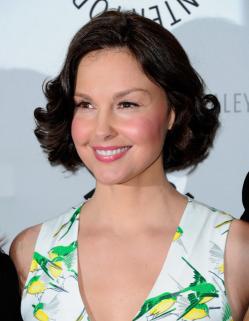Hillary Clinton’s “canckles,” Sarah Palin’s Newsweek covers, Katniss Everdeen’s “baby fat” and Miley Cyrus’s alleged anorexia—the examples of ridiculous scrutiny of women’s bodies are legion. Add to the mix Ashley Judd’s “Puffmaggeddon” (yes, the term actually exists), and the media remains sexist as expected. But what wasn’t expected was Judd’s kickass response in the Daily Beast, in which she spoke out on the “bodysnarking” she has been subjected to recently.
News outlets like the Huffington Post, US Weekly and several blogs—and, more aggressively, the commenters on their websites—have criticized Judd’s “puffy” face, accused her of undergoing plastic surgery (and lying about it), and called her a “cow” and a “pig”. Not that it should matter or we should care, but the puffiness, she explained, was a side-effect of steroid shots used to treat a very serious sinus infection.
But “a sad and disturbing fact” about all this, as Judd writes, is that “this conversation was initially promulgated largely by women.”
“Patriarchy is not men,” she adds. “Patriarchy is a system in which both women and men participate. … We are unable at times to identify ourselves as our own denigrating abusers, or as abusing other girls and women.”
She is talking about the Mean Girls phenomenon, which never fails to be disconcerting. Why do women and girls do this to themselves? If having a perfect face and perfect hairless-everything is so annoying, time-consuming, and sometimes painful, why don’t women and girls just say screw it? Or why don’t they at least support those who choose not to spend inordinate amounts of time and money in pursuit of unattainable ideals of beauty? Why the virulent snark, the vicious, demeaning, dehumanizing harassment?
There’s a certain pleasure in declaring it’s someone else—not you—who is vulnerable. Bullying always reveals the insecurity of the attacker, or in this case, as Judd points out, the collective insecurity of “all girls and women in our culture, [who] to a greater or lesser degree, endure every day, in ways both outrageous and subtle, the assault on our body image, the hypersexualization of girls and women and subsequent degradation of our sexuality as we walk through the decades.”
For girls, having to look their best 24/7 can create resentment towards those who fail to join the competition. It’s as if they are saying, “You are not getting a break: if I had to go through this, so should you.” Men may set the standards, but women all too often are the willing enforcers. Meanwhile, guys like Dominique Strauss-Kahn and Silvio Berlusconi are incidentally both physically and morally decrepit, yet no one talks about their looks.
Wondering why women are mean to each other runs the risk of naiveté, akin to wondering how a Hispanic person can be racist or how “black-on-black” violence can be possible. Women are not a homogenous group; that intra-group abuse happens is not surprising, but it should be acknowledged as the major hindrance to gender equality that it is. And as Judd rightly points out, this misogyny “is subtle, insidious, and never more dangerous than when women passionately deny that they themselves are engaging in it.”
